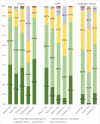Effectiveness and Predictors of Outcomes in a Psychiatric Day Treatment Program for Elementary-Age
- PMID: 33715475
- PMCID: PMC9099084
- DOI: 10.1177/07067437211000627
Effectiveness and Predictors of Outcomes in a Psychiatric Day Treatment Program for Elementary-Age
Abstract
Objective: In this study, we aimed to (1) assess the effectiveness of an intensive multimodal day treatment program in improving externalizing problems and function in elementary-age children and (2) examine 3 predictors of the treatment outcome (i.e., family functioning, baseline severity, and comorbid disorders).
Methods: The sample included 261 children (80.9% boys) between ages of 5 and 12. A retrospective chart review, from 2013 to 2018, and a prospective chart review, from 2018 to 2019, were conducted to extract all relevant data for the present study. Parents and teachers provided reports on children's externalizing problems (i.e., aggressive behavior, attention problems, and rule-breaking behavior) and their level of function across different domains. The level of family functioning was also reported by parents, while clinicians assessed children's severity of disturbance and their diagnoses at intake.
Results: Based on both parents' and teachers' reports, children showed significant improvement in their externalizing problems. Moreover, children showed functional improvement at home, at school, with peers, and in hobbies by the end of the program. Based on teacher's reports, children with lower level of severity showed less improvement in their attention problems, and those with comorbid developmental problems showed less improvement in their aggressive and rule-breaking behaviors. Family functioning did not predict any treatment outcome.
Conclusion: An intensive multimodal day treatment program was effective in reducing the symptoms of externalizing problems in elementary-age children. However, children with less severe difficulties and comorbid developmental problems showed less improvement in their externalizing problems.
Objectif:: Nous visions par la présente étude à 1) évaluer l’efficacité d’un programme multimodal intensif de traitement de jour à améliorer les problèmes et la fonction d’externalisation chez les enfants d’âge primaire, et à 2) examiner trois prédicteurs du résultat du traitement (c.-à-d., le fonctionnement familial, la gravité au départ, et les troubles comorbides).
Méthode:: L’échantillon comprenait 261 enfants (80,9% des garçons) âgés entre 5 et 12 ans. Un examen rétrospectif des dossiers, de 2013 à 2018, et un autre examen prospectif des dossiers, de 2018 à 2019, ont été menés afin d’extraire toutes les données pertinentes pour la présente étude. Les parents et les enseignants ont fourni des rapports sur les problèmes d’externalisation des enfants (c.-à-d., le comportement agressif, les problèmes d’attention et le comportement de non-respect des règles) et sur leur niveau de fonctionnement dans différents domaines. Le niveau de fonctionnement familial était aussi rapporté par les parents, tandis que les cliniciens évaluaient la gravité de la perturbation chez les enfants et leur diagnostic à l’entrée dans le programme.
Résultats:: Selon les rapports tant des parents que des enseignants, les enfants manifestaient une amélioration significative de leurs problèmes d’externalisation. En outre, les enfants démontraient une amélioration fonctionnelle à la maison, à l’école, avec les camarades et dans les loisirs à la fin du programme. D’après les rapports des enseignants, les enfants dont le niveau de gravité était plus faible avaient moins d’amélioration de leurs problèmes d’attention, et ceux dont les problèmes développementaux étaient comorbides avaient moins d’amélioration de leurs comportements agressifs et de non-respect des règles. Le fonctionnement familial ne prédisait aucun résultat du traitement.
Conclusion:: Un programme multimodal intensif de traitement de jour a été efficace pour réduire les symptômes des problèmes d’externalisation chez des enfants d’âge primaire. Cependant, les enfants ayant des difficultés moins graves et des problèmes développementaux comorbides ont manifesté moins d’amélioration de leurs problèmes d’externalisation.
Keywords: comorbidity; day treatment program; externalizing problems; family functioning; severity.
Conflict of interest statement
Figures

Similar articles
-
Health-related quality of life in children and adolescents who have a diagnosis of attention-deficit/hyperactivity disorder.Pediatrics. 2004 Nov;114(5):e541-7. doi: 10.1542/peds.2004-0844. Pediatrics. 2004. PMID: 15520087
-
Creating opportunities for parent empowerment: program effects on the mental health/coping outcomes of critically ill young children and their mothers.Pediatrics. 2004 Jun;113(6):e597-607. doi: 10.1542/peds.113.6.e597. Pediatrics. 2004. PMID: 15173543 Clinical Trial.
-
Parental worry, family-based disaster education and children's internalizing and externalizing problems during the COVID-19 pandemic.Psychol Trauma. 2021 May;13(4):486-495. doi: 10.1037/tra0000932. Epub 2021 Jan 21. Psychol Trauma. 2021. PMID: 33475409
-
An adoption study of the etiology of teacher and parent reports of externalizing behavior problems in middle childhood.Child Dev. 1999 Jan-Feb;70(1):144-54. doi: 10.1111/1467-8624.00011. Child Dev. 1999. PMID: 10191519
-
Comorbid symptom severity in attention-deficit/hyperactivity disorder: a clinical study.J Clin Psychiatry. 2012 May;73(5):711-7. doi: 10.4088/JCP.11m07099. J Clin Psychiatry. 2012. PMID: 22697195
Cited by
-
Measurement-based care in an adolescent partial hospitalization program: Exploring treatment progress and predictors using the top problems assessment.Evid Based Pract Child Adolesc Ment Health. 2025;10(1):72-89. doi: 10.1080/23794925.2024.2306621. Epub 2024 Jan 31. Evid Based Pract Child Adolesc Ment Health. 2025. PMID: 40092633
References
-
- Kim-Cohen J, Caspi A, Moffitt TE, Harrington H, Milne BJ, Poulton R. Prior juvenile diagnoses in adults with mental disorder: developmental follow-back of a prospective-longitudinal cohort. Arch Gen Psychiatry. 2003;60(7):709–717. doi:10.1001/archpsyc. 60.7.709 - PubMed
-
- Lewinsohn PM, Rohde P, Klein DN, Seeley JR. Natural course of adolescent major depressive disorder: I. Continuity into young adulthood. J Am Acad Child Adolesc Psychiatry. 1999;38(1):56–63. doi:10.1097/00004583-199901000-00020 - PubMed
-
- Loeber R, Burke JD, Lahey BB, Winters A, Zera M. Oppositional defiant and conduct disorder: a review of the past 10 years, part I. J Am Acad Child Adolesc Psychiatry. 2000;39(12):1468–1484. doi:10.1097/00004583-200012000-00007 - PubMed
Publication types
MeSH terms
Grants and funding
LinkOut - more resources
Full Text Sources
Other Literature Sources

